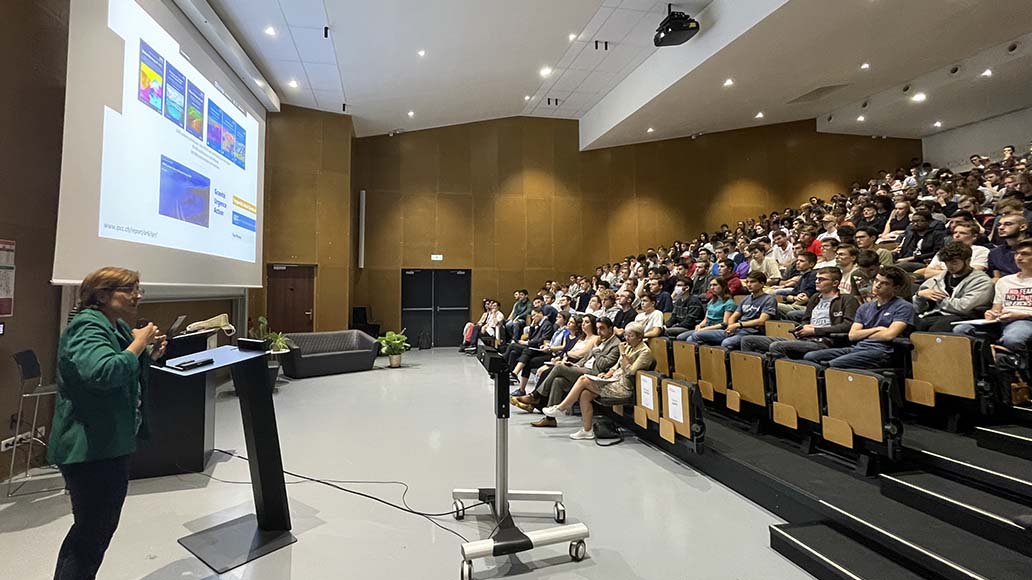Conference on the Challenges of the Climate Future with Valérie Masson-Delmotte

The 1st conference of the “Transition Wednesdays” was held on the theme “Our climate future, a challenge of transformation” with Valérie Masson-Delmotte, a climate scientist ranked among the hundred most influential personalities by American magazine Time.
A Series of Conferences to Understand the Challenges of Energy Transition
This series of conferences was organized by the Training Department as part of the creation of the new IDEAL department, which stands for Sustainable, Responsible Engineering.
Every 2 weeks, experts are invited to raise awareness and develop students’ skills in reducing the environmental footprint of transport.
These conferences provide a forum for discussion and the exchange of ideas, to further reflection, integrate the challenges of socio-environmental transitions into each student’s career plan, and adopt a critical perspective on scenarios and levers for action, while integrating ethical reflection. An opportunity to develop an understanding of the challenges of energy transition.
... 1st conference of the year with climate specialist Valérie Masson-Delmotte
Paleoclimatologist and Director of Research at the CEA Climate and Environmental Sciences Laboratory, Valérie Masson Delmotte is member of the French High Council for Climate, tasked with assessing public policies for reducing greenhouse gas emissions and adapting to climate change. She co-chaired the IPCC working group (Intergovernmental Panel on Climate Change, tasked with assessing the extent, causes and consequences of ongoing climate change), and has since gained a high profile on the national and international scenes.
In her talk to ESTACA students, she began by taking stock of the challenges of climate change, before looking at possible future scenarii and the actions or solutions to be implemented. She emphasized 3 key words: seriousness – urgency – action.
Climate Action
The actions being implemented in over 18 countries are gaining momentum, but “the pace and scale of actions implemented, and commitments made are insufficient to limit the risks associated with climate change”.
Global greenhouse gas emissions from human activities continue to rise, with uneven historical and current contributions. The dominant factor in global warming is cumulative CO2 emissions.
Human-induced climate change is adversely affecting physical and mental health, particularly among younger generations (pollutants and allergens, agricultural production and dietary changes, physical exercise, mortality among the elderly in heatwaves, etc.).
There are 4 major risks to consider: extreme heat, agriculture, water shortages and flooding. Sea level rise will continue for millennia, but its speed and extent depend on future emissions.
“If you want to change the future, you've chosen the right school!”
Valérie Masson-Delmotte recalled that “the challenges of transformation are vast, and we are all actors of change”. Engineers in the mobility sector are on the front line since greenhouse gas emissions from transport account for 15% worldwide and 30% in France. They are on the rise and are mainly related to land transport. Rail is the most efficient means of transport, with the lowest emissions.
“The transport sector is the 1st emitting sector and the one in which there are the most considerable challenges to be met. If you want to change the future, you’ve chosen the right school!” she told ESTACA students.
For example, by 2050 there is a 2/3 potential of reduction in land transport emissions; there is great potential for innovation in private vehicles, active mobility and public transport.
The air transport sector is also under pressure, as it remains difficult to decarbonize.
We need therefore to rely on both technological progress and changes in our lifestyle habits to make a difference tomorrow. And Valérie Masson-Delmotte insisted: “To be effective, climate action must be fair, inclusive and based on shared knowledge. We need to build strategies to make low-carbon lifestyles accessible.”
And she concluded: “You, future engineers, must use your knowledge and project yourselves into 2050 with zero greenhouse gas emissions, to anticipate and prepare for profound change. You can bring about this change!”













